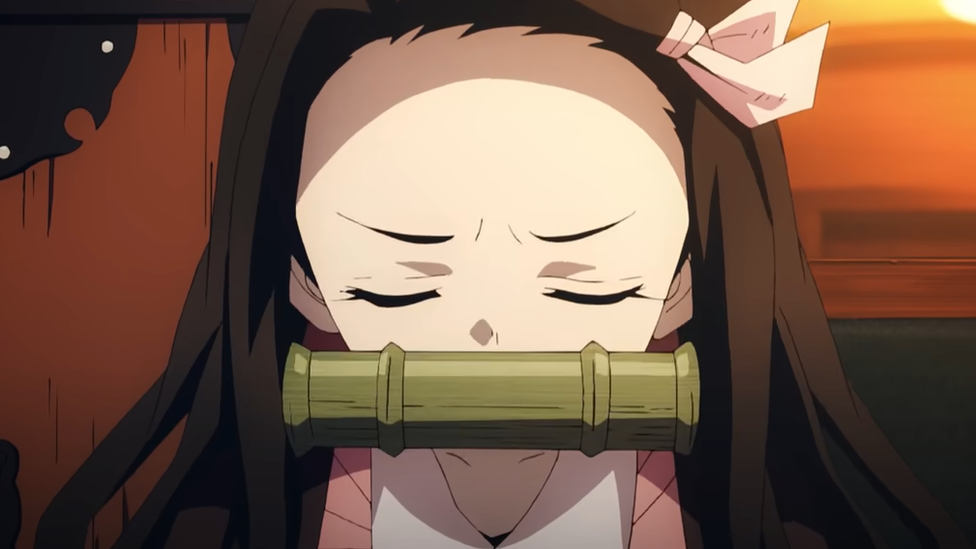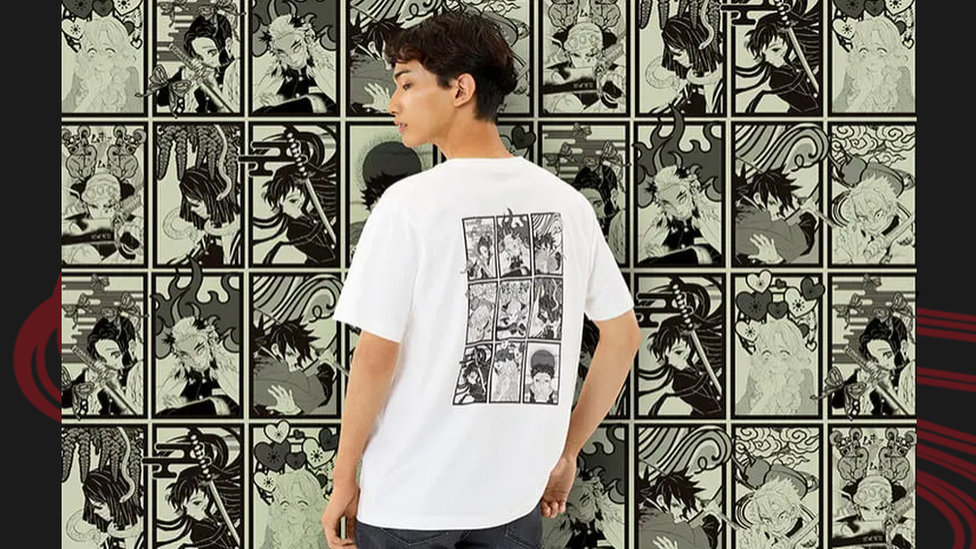How a demon slaying film is drawing Japan back to the cinemas
By Yvette Tan
BBC News
-
- Published

It's a movie about a boy who's turned into a demon slayer. But that isn't the only thing he's slaying - Demon Slayer The Movie: Mugen Train has also been making a killing at the Japanese box office - becoming the fastest film in Japanese cinema history, taking just 10 days to make 10 billion yen ($95.3m; £72m).
In doing so, it beat Japanese anime classic Spirited Away which took 25 days to reach the same milestone. Some cinemas screened it more than 40 times a day.
Japan is now seeing a relative rise in the number of Covid cases, with more than 200 cases reported in the capital Tokyo on Thursday.
So what is it about this film that has got Japanese going back to the cinemas despite the risk of infection?
What's the movie about?
The film's based on a wildly popular Japanese comic - or manga - of the same name.
The plot revolves around a boy who turns into a demon slayer after almost all his family is killed, and his sister is turned into a demon.
The film follows him as he continues to battle demons onboard a moving train.
The comic book, which has 22 volumes, has a circulation of more than 100 million copies, according to news site the Mainichi, which quotes publisher Shueisha Inc.
Earlier last year, it was adapted into an anime television series - which again become wildly popular, with Japanese viewers calling it their favourite anime series of all time, according to a survey by mobile operator NTT Docomo.
Its popularity took off globally when the series was picked up by streaming giant Netflix.
So it wasn't a complete surprise that the movie was well received - though it still managed to surpass expectations, taking in $44 million in revenue in its first three days of screening.
"One answer as to why the movie is so popular is to go back to the reason why the manga and anime series are so popular," Professor Northrop Davis of the University of South Carolina told the BBC.
"Antagonist characters in legacy western comics were traditionally one dimensional. Manga however, shades the antagonists' personalities to give readers reasons to understand their motivations. A "relatability" if you will. The characters, including the demons, have well developed back stories."
Why?
The film was always going to pull in the views - that much was obvious from the huge cult following it had racked up from both the TV series and the manga.
But there's also the fact that there it really didn't have any competition.
Dozens of movies have had their release dates delayed, or production halted completely due to the pandemic. Films like James Bond and the Fast and Furious series have been postponed in Japan, and even local films like the Detective Conan series have been postponed.
In fact, one of the only major Hollywood films that's showing in Japanese cinemas now is the Christopher Nolan film Tenet.

Japanese cinemas have been struggling, like most other cinema chains across the world. The government ordered them to stay open, but provided little financial help.
So naturally, cinema chains jumped on this one golden opportunity it had to draw audiences back.
On opening day, one of Japan's biggest cinema chains Toho, screened the movie 42 times in its Shinjuku branch - an unusually high number by Japanese standards.
A handful of other cinemas also had more than 40 showings of the movie - in just one day.
According to the Asahi Shimun, some on social media commented that the movie's screening schedule looked more like a "timetable for trains and buses".
The number of screenings have since gone down slightly -to around 20 screenings per day on weekdays, and 30 on weekends.
And then there's the element of escapism.
Professor Susan Napier of Tufts University says that after months of the pandemic, there could be a "pent up demand, especially on the part of young people to experience a pleasure they... have not experienced for a long time".
Is it safe to go to cinemas?
Cinemas in Japan are currently allowed to open at either 50% capacity if they also allow food and drinks to be sold, or at 100% capacity without - which is to say, social distancing is not in place.
However, all cinema goers are told to wear masks and not talk while inside the hall, while cinema staff are also decked out in protective equipment.
One cinemagoer told the Mainichi that the halls were not too full as there were multiple screens showing the movie, adding that she wasn't too worried about the risk of infection.
And Japanese officials definitely aren't discouraging moviegoers.

In fact, the government's top spokesman Chief Cabinet Secretary Katsunobu Kato reportedly said in his daily press conference that the film had "contributed greatly to the movie industry" - adding that he himself had watched the series.
But it's not just Japan's cinemas that are cashing in.
Clothing stores, food stores, stationery shops and toy stores have all been making the most of the Demon Slayer craze.
Popular clothing store Uniqlo is selling Demon Slayer themed merchandise, and convenience chain Lawson is putting Demon Slayer snacks on its shelves.
"film" - Google News
October 30, 2020 at 10:18AM
https://ift.tt/37TGbFl
How a demon slaying film is drawing Japan back to the cinemas - BBC News
"film" - Google News
https://ift.tt/2qM7hdT
https://ift.tt/3fb7bBl
Bagikan Berita Ini














0 Response to "How a demon slaying film is drawing Japan back to the cinemas - BBC News"
Post a Comment